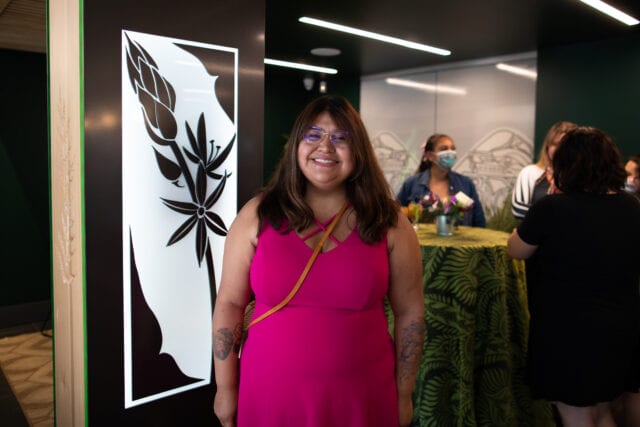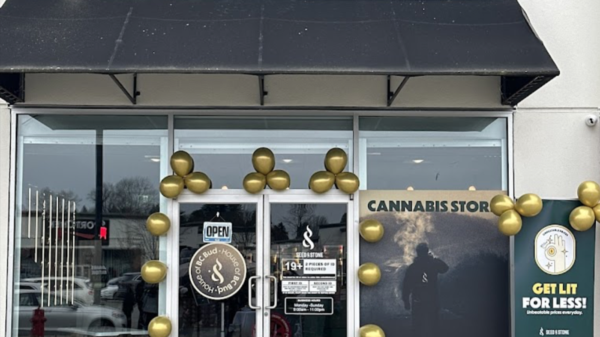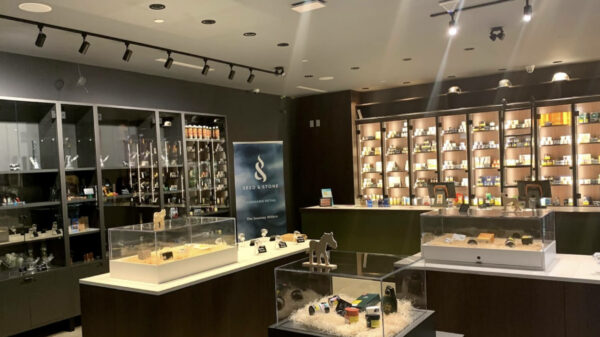The Songhees Nation’s first co-owned cannabis store in downtown Victoria is a statement piece in more ways than one. At first glance, it’s a melding of Indigenous art and West Coast beauty but it’s also a testament to the Nation’s space in the market.
Seed & Stone – Songhees Edition officially opened Monday and will be co-owned by the Songhees Nation of the lək̓ʷəŋən (Lekwungen) People, and Seed & Stone CEO Vikram Sachdeva.
The cannabis store is a statement piece, says Christina Clarke, CEO of Songhees Development Corporation.
“It’s very West Coast feeling,” she says of the art and interior design. “It becomes a place you just want to hang out in.”
Clarke tells Mugglehead that Indigenous artist Jessica Joseph chose a fitting theme of plants, for wood carvings, art and decorative panels at the 901 Gordon St. location. She says the design highlights the Lekwungen people’s connection between language and land.
“She interviewed knowledge keepers about the various plants that she was looking at and exploring what they mean and how they were used,” Clarke adds.

Jessica Joseph chose a plant theme for the Seed & Stone – Songhees Edition store. Photo by Jay Wallace
BC ‘has no business competing with us’
As for B.C.’s weed market, Clarke’s one criticism was for the provincial government to respect the Nation’s space in the market.
“The province in B.C. has no business competing with us,” she says, explaining the province did step away from opening up a shop in downtown Victoria after it was asked not to compete.
“They should be promoting businesses like ours and supplying, and not undercutting prices and having their own stores,” she says. “I wish that they would not consider this as a revenue stream for them, but consider this as economy building for everybody else.”
Read more: Mohawk Council of Kahnawà:ke signs cannabis agreement with Health Canada
Read more: ‘Let’s talk economic reconciliation and cannabis’, says Red Market Brand co-founder
Understanding the Songhees Nation is also about understanding its economics, Clarke says, which is why the store will be part of the Nation’s cultural walking tours to teach those who are curious about the Songhees.
“Virtually everything we do in economic development is a social enterprise. Ultimately, the revenues are going back to the Songhees to support programs,” she says.
Songhees aims to advance Indigenous supply chain
After first entering the cannabis market in the Spring, the Songhees Nation is looking ahead at opportunities.
Another co-owned shop with Seed & Stone is slated to open at Victoria’s Bay Centre this summer, with a theme of “Island living” to showcase local products.
In the future, Clarke explains the stores would like to feature Indigenous brands of cannabis. But since many operate in the grey market, she says the store is holding off for now.
“We’re looking at potentially a micro-growth facility so that we can create some of these licensed products that are Indigenous,” she says, adding there’s a possibility for delivery and adding a drive-thru one day.
By offering a strong selection of products, Clarke hopes to draw more people into the regulated market.
She emphasizes the vital relationship with Seed & Stone’s Sachdeva, noting how the budding friendship is built on trust and aligned values, allowing the partnership to bloom.
“He sees the world very similar to how we do, and we are excited about where we can take the partnership.”
Read more: Delta, BC mostly pro-pot shop ahead of first store’s fate in July
The Songhees Nation first entered the retail cannabis market in April with Songhees Cannabis S + S. The Nation has majority ownership of that store.
The “S + S” stands for ‘Skʷati Sῤaƛ̓ǝŋ’ which means “Crazy Smoke” in Lekwungen.
Entering cannabis retail wasn’t a decision Songhees took lightly, said Chief Ron Sam in the Spring. There were years of discussion with the community before the first store opened.

Chief Ron Sam said entering cannabis retail wasn’t a decision Songhees took lightly. Image via Province of B.C. Flickr.
“What we consistently heard from our members is that the opportunity to influence and promote education and informed decision making as a primary component to harm reduction is important to them, as are the jobs and training opportunities in this specialized field,” he said in a statement.
Clarke says all Songhees Nation’s stores have a blend of Indigenous and non-Indigenous staff.
Follow Kathryn Tindale on Twitter
kathryn@mugglehead.com














